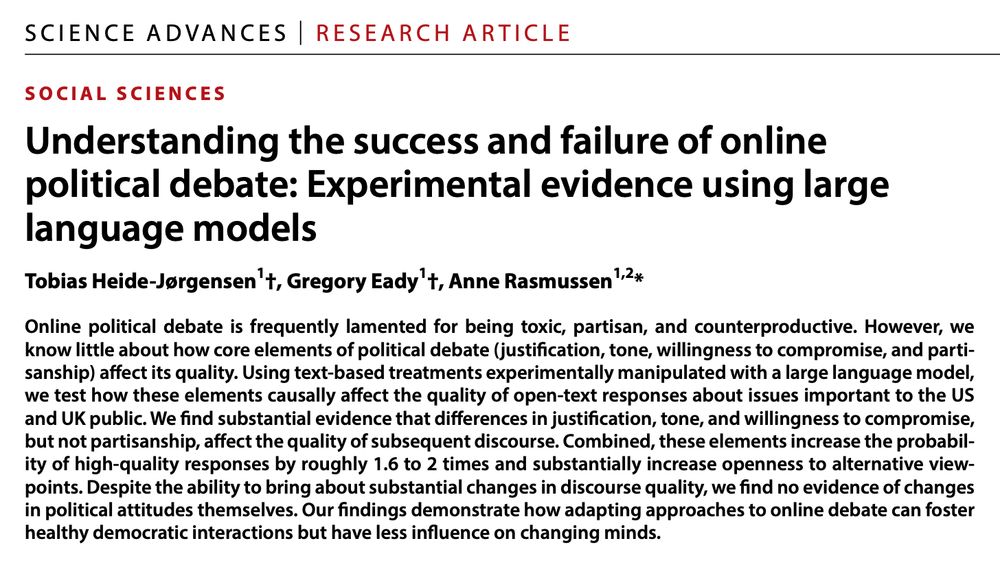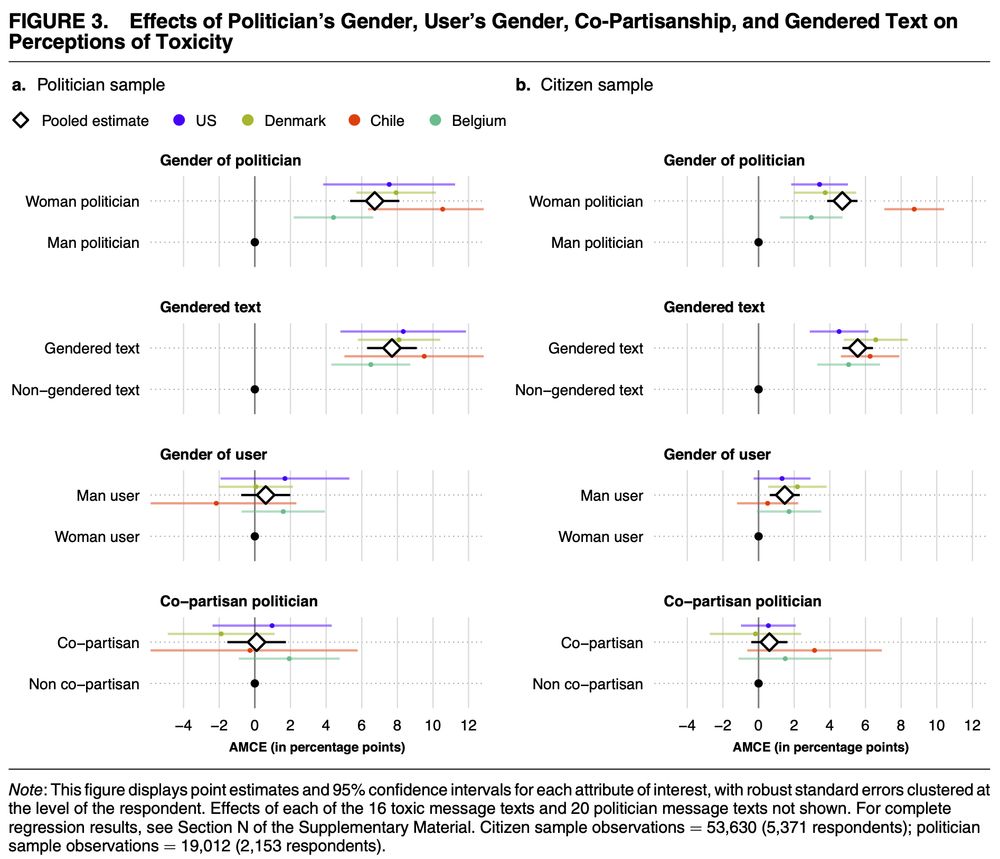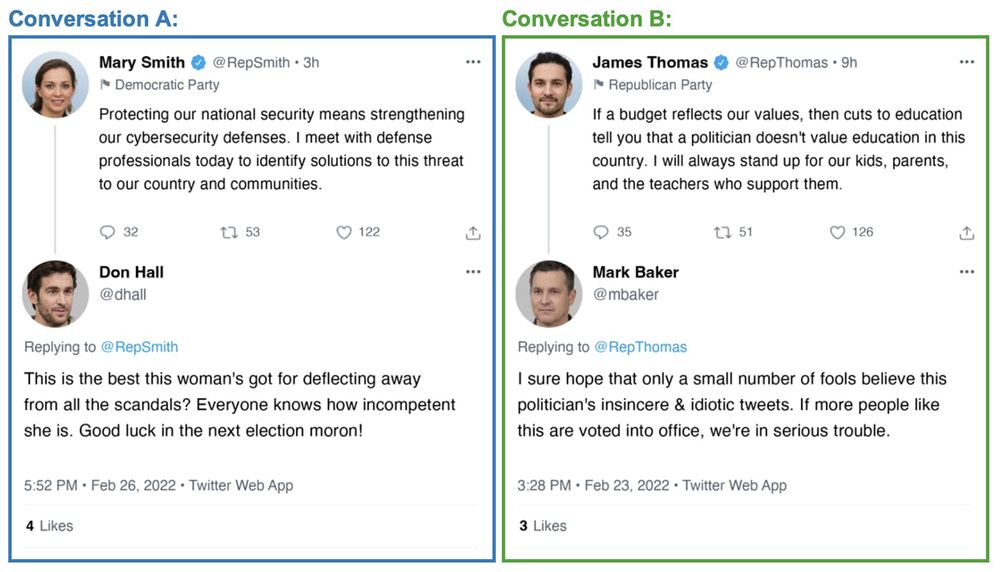
Anne Rasmussen
@annerasmussen.bsky.social
Prof of Pol Science @kingscollegelondon.bsky.social
University of Copenhagen. Lobbying | Political Representation | Public Opinion & Policy | Gender | Social Media | EIC @igajournal.bsky.social | PI ADVODID ERC Grant |ECPR ExecComm
https://annerasmussen.eu
University of Copenhagen. Lobbying | Political Representation | Public Opinion & Policy | Gender | Social Media | EIC @igajournal.bsky.social | PI ADVODID ERC Grant |ECPR ExecComm
https://annerasmussen.eu
A mediation analysis suggests why:
If interest groups matter, their influence is mostly indirect—by shaping politicians’ own views, which in turn are associated with their (biased) perceptions of citizens.
7/10
If interest groups matter, their influence is mostly indirect—by shaping politicians’ own views, which in turn are associated with their (biased) perceptions of citizens.
7/10


September 29, 2025 at 7:18 AM
A mediation analysis suggests why:
If interest groups matter, their influence is mostly indirect—by shaping politicians’ own views, which in turn are associated with their (biased) perceptions of citizens.
7/10
If interest groups matter, their influence is mostly indirect—by shaping politicians’ own views, which in turn are associated with their (biased) perceptions of citizens.
7/10
We compare what citizens actually think on 5 salient policy issues (immigration, safety, healthcare, culture, environment) with politicians’ estimates
On average, politicians misestimate support by 22 percentage points (!).
BUT biases vary a lot (!) by issue & country.
2/10
On average, politicians misestimate support by 22 percentage points (!).
BUT biases vary a lot (!) by issue & country.
2/10

September 29, 2025 at 7:18 AM
We compare what citizens actually think on 5 salient policy issues (immigration, safety, healthcare, culture, environment) with politicians’ estimates
On average, politicians misestimate support by 22 percentage points (!).
BUT biases vary a lot (!) by issue & country.
2/10
On average, politicians misestimate support by 22 percentage points (!).
BUT biases vary a lot (!) by issue & country.
2/10
🚨 New paper in @thejop.bsky.social
Why do politicians often misperceive what citizens' policy positions are?
@simonotjes.bsky.social and I study ~10,000 estimates of public opinion by politicians in Denmark & the Netherlands to uncover the sources of these (mis)perceptions
Thread 🧵1/10
Why do politicians often misperceive what citizens' policy positions are?
@simonotjes.bsky.social and I study ~10,000 estimates of public opinion by politicians in Denmark & the Netherlands to uncover the sources of these (mis)perceptions
Thread 🧵1/10

September 29, 2025 at 7:18 AM
🚨 New paper in @thejop.bsky.social
Why do politicians often misperceive what citizens' policy positions are?
@simonotjes.bsky.social and I study ~10,000 estimates of public opinion by politicians in Denmark & the Netherlands to uncover the sources of these (mis)perceptions
Thread 🧵1/10
Why do politicians often misperceive what citizens' policy positions are?
@simonotjes.bsky.social and I study ~10,000 estimates of public opinion by politicians in Denmark & the Netherlands to uncover the sources of these (mis)perceptions
Thread 🧵1/10
Crucially, high-quality argumentation improves perceptions of the interlocutor: they are seen as more open-minded, informed, respectful, and reasonable—traits that in turn predict higher-quality replies.
10/n
10/n

July 28, 2025 at 8:37 AM
Crucially, high-quality argumentation improves perceptions of the interlocutor: they are seen as more open-minded, informed, respectful, and reasonable—traits that in turn predict higher-quality replies.
10/n
10/n
Second, another basic finding. For each feature of an argument:
(1) Respect begets respect
(2) Evidence elicits evidence
(3) Openness invites openness
(4) Disrespect provokes partisan attacks
When arguing about politics, you get what you give.
9/n
(1) Respect begets respect
(2) Evidence elicits evidence
(3) Openness invites openness
(4) Disrespect provokes partisan attacks
When arguing about politics, you get what you give.
9/n

July 28, 2025 at 8:37 AM
Second, another basic finding. For each feature of an argument:
(1) Respect begets respect
(2) Evidence elicits evidence
(3) Openness invites openness
(4) Disrespect provokes partisan attacks
When arguing about politics, you get what you give.
9/n
(1) Respect begets respect
(2) Evidence elicits evidence
(3) Openness invites openness
(4) Disrespect provokes partisan attacks
When arguing about politics, you get what you give.
9/n
First, put simply, how people argue matters a lot.
Evidence-based, respectful, compromise-seeking, and non-partisan counter-arguments substantially increase the probability of High Quality replies...
(HQ = justification/compromise+respectful+no partisan attacks)
6/n
Evidence-based, respectful, compromise-seeking, and non-partisan counter-arguments substantially increase the probability of High Quality replies...
(HQ = justification/compromise+respectful+no partisan attacks)
6/n

July 28, 2025 at 8:37 AM
First, put simply, how people argue matters a lot.
Evidence-based, respectful, compromise-seeking, and non-partisan counter-arguments substantially increase the probability of High Quality replies...
(HQ = justification/compromise+respectful+no partisan attacks)
6/n
Evidence-based, respectful, compromise-seeking, and non-partisan counter-arguments substantially increase the probability of High Quality replies...
(HQ = justification/compromise+respectful+no partisan attacks)
6/n
Survey respondents write their opinion on a political issue they care about.
An LLM then generates a counter-argument, randomizing the four features, 2×2×3×2 = 24 possibilities:
evidence/emotion x open/closed to compromise x in-/out-/non-partisan x respectful/disrespectful
3/n
An LLM then generates a counter-argument, randomizing the four features, 2×2×3×2 = 24 possibilities:
evidence/emotion x open/closed to compromise x in-/out-/non-partisan x respectful/disrespectful
3/n

July 28, 2025 at 8:37 AM
Survey respondents write their opinion on a political issue they care about.
An LLM then generates a counter-argument, randomizing the four features, 2×2×3×2 = 24 possibilities:
evidence/emotion x open/closed to compromise x in-/out-/non-partisan x respectful/disrespectful
3/n
An LLM then generates a counter-argument, randomizing the four features, 2×2×3×2 = 24 possibilities:
evidence/emotion x open/closed to compromise x in-/out-/non-partisan x respectful/disrespectful
3/n
🚨 New paper in Science Advances @science.org
Can changing how we argue about politics online improve the quality of replies we get?
T HeideJorgensen, @gregoryeady.bsky.social & I use an LLM to manipulate counter-arguments to see how people respond to different approaches to arguments
Thread 🧵1/n
Can changing how we argue about politics online improve the quality of replies we get?
T HeideJorgensen, @gregoryeady.bsky.social & I use an LLM to manipulate counter-arguments to see how people respond to different approaches to arguments
Thread 🧵1/n

July 28, 2025 at 8:37 AM
🚨 New paper in Science Advances @science.org
Can changing how we argue about politics online improve the quality of replies we get?
T HeideJorgensen, @gregoryeady.bsky.social & I use an LLM to manipulate counter-arguments to see how people respond to different approaches to arguments
Thread 🧵1/n
Can changing how we argue about politics online improve the quality of replies we get?
T HeideJorgensen, @gregoryeady.bsky.social & I use an LLM to manipulate counter-arguments to see how people respond to different approaches to arguments
Thread 🧵1/n
Results 4:
The perceived motives behind toxic behavior toward women and men differ:
- Toxic behavior toward women politicians is connected with prejudice and desires to push them out of politics
- And LESS likely to seen as motivated by opinion differences
[10/14]
The perceived motives behind toxic behavior toward women and men differ:
- Toxic behavior toward women politicians is connected with prejudice and desires to push them out of politics
- And LESS likely to seen as motivated by opinion differences
[10/14]

December 11, 2024 at 4:53 PM
Results 4:
The perceived motives behind toxic behavior toward women and men differ:
- Toxic behavior toward women politicians is connected with prejudice and desires to push them out of politics
- And LESS likely to seen as motivated by opinion differences
[10/14]
The perceived motives behind toxic behavior toward women and men differ:
- Toxic behavior toward women politicians is connected with prejudice and desires to push them out of politics
- And LESS likely to seen as motivated by opinion differences
[10/14]
Results 3:
These judgments hold across all relevant sub-groups of politician and citizen respondents
[9/14]
These judgments hold across all relevant sub-groups of politician and citizen respondents
[9/14]

December 11, 2024 at 4:53 PM
Results 3:
These judgments hold across all relevant sub-groups of politician and citizen respondents
[9/14]
These judgments hold across all relevant sub-groups of politician and citizen respondents
[9/14]
Results 2:
Stronger effects when toxic behavior is gendered or the perpetrator is a man
[8/14]
Stronger effects when toxic behavior is gendered or the perpetrator is a man
[8/14]

December 11, 2024 at 4:53 PM
Results 2:
Stronger effects when toxic behavior is gendered or the perpetrator is a man
[8/14]
Stronger effects when toxic behavior is gendered or the perpetrator is a man
[8/14]
Results 1:
Strong evidence that perceptions of toxic behavior depend on context. Equivalent messages to women are judged as more toxic
[7/14]
Strong evidence that perceptions of toxic behavior depend on context. Equivalent messages to women are judged as more toxic
[7/14]

December 11, 2024 at 4:53 PM
Results 1:
Strong evidence that perceptions of toxic behavior depend on context. Equivalent messages to women are judged as more toxic
[7/14]
Strong evidence that perceptions of toxic behavior depend on context. Equivalent messages to women are judged as more toxic
[7/14]
Empirical strategy:
Visual conjoint survey experiments that mimic toxic conversations on social media in the US, Belgium, Chile, and Denmark
Respondents: Politicians (~350-1000 per country) & citizens (~1,200 per country)
[5/14]
Visual conjoint survey experiments that mimic toxic conversations on social media in the US, Belgium, Chile, and Denmark
Respondents: Politicians (~350-1000 per country) & citizens (~1,200 per country)
[5/14]

December 11, 2024 at 4:53 PM
Empirical strategy:
Visual conjoint survey experiments that mimic toxic conversations on social media in the US, Belgium, Chile, and Denmark
Respondents: Politicians (~350-1000 per country) & citizens (~1,200 per country)
[5/14]
Visual conjoint survey experiments that mimic toxic conversations on social media in the US, Belgium, Chile, and Denmark
Respondents: Politicians (~350-1000 per country) & citizens (~1,200 per country)
[5/14]
Delighted that @gregoryeady.bsky.social and my paper "Gendered Perceptions and the Costs of Political Toxicity: Experimental Evidence from Politicians and Citizens in Four Democracies" is now online @apsrjournal.bsky.social (Open access)
More in this [1/14]
More in this [1/14]

December 11, 2024 at 4:53 PM
Delighted that @gregoryeady.bsky.social and my paper "Gendered Perceptions and the Costs of Political Toxicity: Experimental Evidence from Politicians and Citizens in Four Democracies" is now online @apsrjournal.bsky.social (Open access)
More in this [1/14]
More in this [1/14]
Results 4:
The perceived motives behind toxic behavior toward women and men differ:
- Toxic behavior toward women politicians is connected with prejudice and desires to push them out of politics
- And LESS likely to seen as motivated by opinion differences
[9/14]
The perceived motives behind toxic behavior toward women and men differ:
- Toxic behavior toward women politicians is connected with prejudice and desires to push them out of politics
- And LESS likely to seen as motivated by opinion differences
[9/14]

December 11, 2024 at 4:36 PM
Results 4:
The perceived motives behind toxic behavior toward women and men differ:
- Toxic behavior toward women politicians is connected with prejudice and desires to push them out of politics
- And LESS likely to seen as motivated by opinion differences
[9/14]
The perceived motives behind toxic behavior toward women and men differ:
- Toxic behavior toward women politicians is connected with prejudice and desires to push them out of politics
- And LESS likely to seen as motivated by opinion differences
[9/14]
Results 3:
These judgments hold across all relevant sub-groups of politician and citizen respondents
[8/14]
These judgments hold across all relevant sub-groups of politician and citizen respondents
[8/14]

December 11, 2024 at 4:36 PM
Results 3:
These judgments hold across all relevant sub-groups of politician and citizen respondents
[8/14]
These judgments hold across all relevant sub-groups of politician and citizen respondents
[8/14]
Results 2:
Stronger effects when toxic behavior is gendered or the perpetrator is a man
[7/14]
Stronger effects when toxic behavior is gendered or the perpetrator is a man
[7/14]

December 11, 2024 at 4:36 PM
Results 2:
Stronger effects when toxic behavior is gendered or the perpetrator is a man
[7/14]
Stronger effects when toxic behavior is gendered or the perpetrator is a man
[7/14]
Results 1:
Strong evidence that perceptions of toxic behavior depend on context. Equivalent messages to women are judged as more toxic
[6/14]
Strong evidence that perceptions of toxic behavior depend on context. Equivalent messages to women are judged as more toxic
[6/14]

December 11, 2024 at 4:36 PM
Results 1:
Strong evidence that perceptions of toxic behavior depend on context. Equivalent messages to women are judged as more toxic
[6/14]
Strong evidence that perceptions of toxic behavior depend on context. Equivalent messages to women are judged as more toxic
[6/14]
Empirical strategy:
Visual conjoint survey experiments that mimic toxic conversations on social media in the US, Belgium, Chile, and Denmark
Respondents: Politicians (~350-1000 per country) & citizens (~1,200 per country)
[4/14]
Visual conjoint survey experiments that mimic toxic conversations on social media in the US, Belgium, Chile, and Denmark
Respondents: Politicians (~350-1000 per country) & citizens (~1,200 per country)
[4/14]

December 11, 2024 at 4:36 PM
Empirical strategy:
Visual conjoint survey experiments that mimic toxic conversations on social media in the US, Belgium, Chile, and Denmark
Respondents: Politicians (~350-1000 per country) & citizens (~1,200 per country)
[4/14]
Visual conjoint survey experiments that mimic toxic conversations on social media in the US, Belgium, Chile, and Denmark
Respondents: Politicians (~350-1000 per country) & citizens (~1,200 per country)
[4/14]
Happy to share that research by @gregoryeady.bsky.social & me on
"Gendered Perceptions of Toxicity Online"
forthcoming @apsrjournal.bsky.social, has contributed to two news stories that made it to the front page of Danish @politiken.dk
politiken.dk/danmark/art1...
politiken.dk/danmark/art1...
"Gendered Perceptions of Toxicity Online"
forthcoming @apsrjournal.bsky.social, has contributed to two news stories that made it to the front page of Danish @politiken.dk
politiken.dk/danmark/art1...
politiken.dk/danmark/art1...


December 2, 2024 at 4:19 PM
Happy to share that research by @gregoryeady.bsky.social & me on
"Gendered Perceptions of Toxicity Online"
forthcoming @apsrjournal.bsky.social, has contributed to two news stories that made it to the front page of Danish @politiken.dk
politiken.dk/danmark/art1...
politiken.dk/danmark/art1...
"Gendered Perceptions of Toxicity Online"
forthcoming @apsrjournal.bsky.social, has contributed to two news stories that made it to the front page of Danish @politiken.dk
politiken.dk/danmark/art1...
politiken.dk/danmark/art1...
Delighted to share the fantastic lineup of upcoming speakers for our @kcl-spe.bsky.social Comparative Politics Speaker Series @kingscollegelondon.bsky.social!
Thanks to Raluca Pahontu for co-organizing many of the speakers
Feel free to reach out to @ninaobermeier.com or me if you'd like to attend
Thanks to Raluca Pahontu for co-organizing many of the speakers
Feel free to reach out to @ninaobermeier.com or me if you'd like to attend

November 21, 2024 at 9:47 AM
Delighted to share the fantastic lineup of upcoming speakers for our @kcl-spe.bsky.social Comparative Politics Speaker Series @kingscollegelondon.bsky.social!
Thanks to Raluca Pahontu for co-organizing many of the speakers
Feel free to reach out to @ninaobermeier.com or me if you'd like to attend
Thanks to Raluca Pahontu for co-organizing many of the speakers
Feel free to reach out to @ninaobermeier.com or me if you'd like to attend
Our school made it here in case you’d like to keep track of work from and news about all my cool @kcl-spe.bsky.social @kingscollegelondon.bsky.social colleagues ;-)

November 19, 2024 at 3:19 PM
Our school made it here in case you’d like to keep track of work from and news about all my cool @kcl-spe.bsky.social @kingscollegelondon.bsky.social colleagues ;-)
By contrast, citizens with behavioural or attitudinal ties to business groups consider unequal group representation in either direction as similarly legitimate
Only an emotional tie (trust) leads to a stronger preference for the representation of business groups [8/11]
Only an emotional tie (trust) leads to a stronger preference for the representation of business groups [8/11]


September 10, 2024 at 10:32 AM
By contrast, citizens with behavioural or attitudinal ties to business groups consider unequal group representation in either direction as similarly legitimate
Only an emotional tie (trust) leads to a stronger preference for the representation of business groups [8/11]
Only an emotional tie (trust) leads to a stronger preference for the representation of business groups [8/11]
Ties to cause groups representing society are more consequential than ties to business interests.
Citizens with any type of ties to cause groups consider processes that under-represent these groups as less legitimate than processes that under-represent business groups [7/11]
Citizens with any type of ties to cause groups consider processes that under-represent these groups as less legitimate than processes that under-represent business groups [7/11]

September 10, 2024 at 10:32 AM
Ties to cause groups representing society are more consequential than ties to business interests.
Citizens with any type of ties to cause groups consider processes that under-represent these groups as less legitimate than processes that under-represent business groups [7/11]
Citizens with any type of ties to cause groups consider processes that under-represent these groups as less legitimate than processes that under-represent business groups [7/11]
We find that citizens have a preference for consulting groups to which they have emotional ties (i.e., trust), behavioural ties (i.e. actual engagement in groups), or attitudinal ties, where citizens and interest groups share ideological views [5/11]



September 10, 2024 at 10:31 AM
We find that citizens have a preference for consulting groups to which they have emotional ties (i.e., trust), behavioural ties (i.e. actual engagement in groups), or attitudinal ties, where citizens and interest groups share ideological views [5/11]

